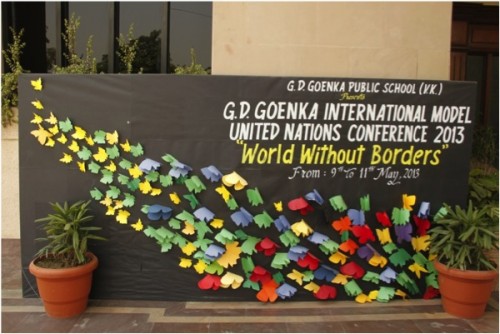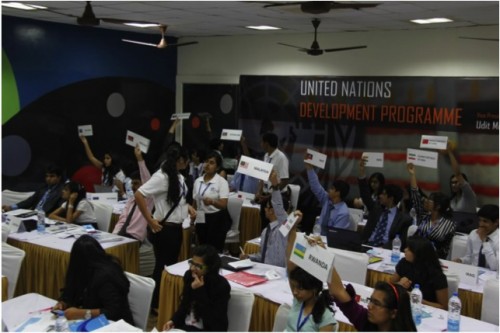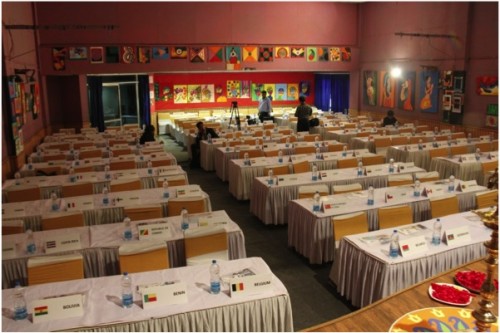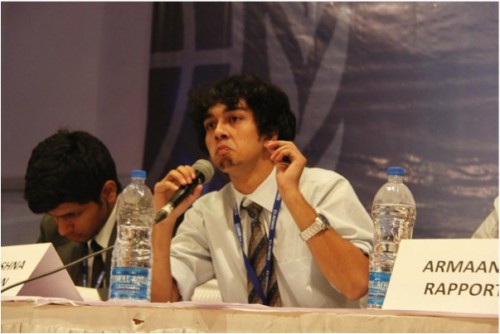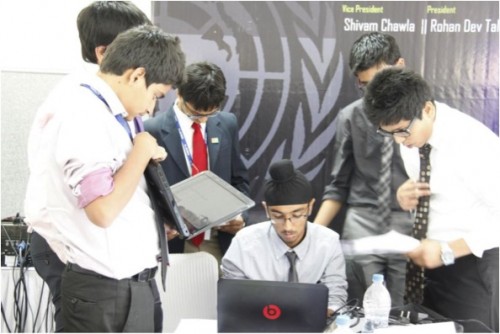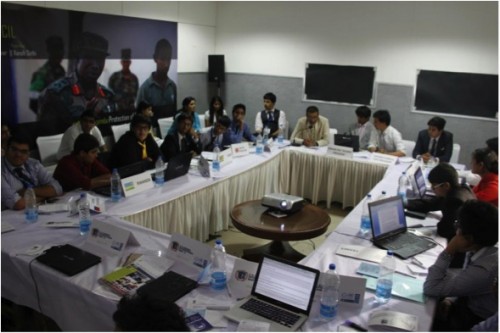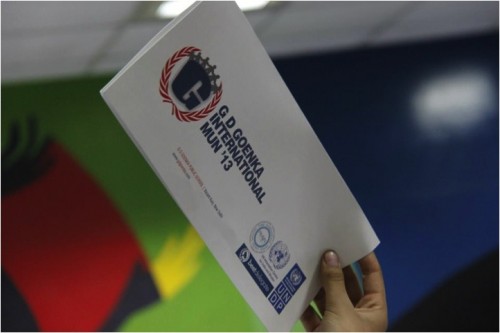After the moving speech by the Secretary General, the delegates moved to their committees. The seven committees simulated included the Security Council, Human Rights Council, International Atomic Energy Agency, United Nations Development Programme, Indian War Cabinet of 1999, Economic and Social Council and the General Assembly. Each committee had innovative agendas. For example, the agenda for HRC was capital punishment. There were extensive debates on the definition and scope of arbitrary punishment. This was something that each delegate had their own opinion on, hence the debate got quite heated with delegates quoting the religious books and such like. With allegations being thrown on almost every country, the HRC had many passionate delegates as did the ECOSOC whose agenda was the Eurozone crisis in Europe.
The General Assembly’s agenda was the demilitarization of the Arctic. The Arctic is a home for four million people so, delegates were urged to look for solutions that would protect the indigenous resources as well, as look after the interests of Arctic’s resources. To come to a compromise was not an easy task. Delegates were posed with an ethical debate. The leading powers of the world also fighting for the Arctic lead to a complete breakdown in diplomacy. A crisis acted as a divergent to the constant bickering. The crisis was also about the Arctic region and it gave an opportunity to the delegates to delve deeper in the UN laws of the sea. After, the crisis the delegates saw the futility of disunity as damage to the Arctic affected the world community.
The delegates participating in the Indian War Cabinet were transported back to the times of the Kargil War. The committee commenced with the Prime Minister, Atul Bihari Vajpayee declaring war on Pakistan. The delegates then were given repeated updates on Pakistan’s advancements on the Indian borders and had to think on their feet on how India was supposed to win this war. The committee was regularly in two minds with regard to the direction that India should take because of the symbolic message it would send to the international community. By not crossing the border India would look like a weak state and might invite further trouble. But the path they chose to take was to fight from Indian soil. A press conference was held on the third day where the Indian War Cabinet consisting of the high-ranking officials were grilled by the international press members about their actions.
Other committees also saw delegates thinking creatively like the Security Council where the delegates whilst hotly debating ways to protect civilians in areas of armed conflict was given a crisis about the inside story of Sarabjit Singh’s death and the proliferation of the People’s Liberation Army into India’s territory. The Security Council was faced with a dual challenge with India, Pakistan and China in the limelight. The “real life” component that was given to the crises in the committees gave the opportunity for each delegate in committee to participate. The UNDP’s agenda was the availability of retroviral drugs for the heinous HIV/AIDS infection. Debates centred around the high prices of the drugs, patent laws, duty laws. The delegates were able to show a depth of knowledge on a very specialized and technical issue. But the end result was commendable with the delegates coming up with ground breaking solutions like patent pools.
Since MUN conferences are competitive, there were the formations of divergent blocs in each committee. But this reflected the in- depth research done on the parts of the delegates to make sure they didn’t betray the stance of their country. Communiques and resolutions were passed in each committee.
What followed was a closing ceremony with two notable chief guests, Major General Bakshi who found the committee simulating the Indian War Cabinet particularly interesting, since he had fought the Kargil War and Deepak Vohra, the Indian Ambassador to South Sudan. Major General Bakshi gave a speech about the importance of role-play in the army. And how the Model United Nations being simulated at GIMUN was role play. He was surprised at the authenticity of the role play that goes on in a Model United Nations conference. He said there is no better way to learn than through role play and he was shocked to see the kind of research the delegates and the chairs showed. Much to the delight of the delegates of the IWC, he gave important insights into his battle at Kargil. He told them his real life experiences about something that they had been discussing about for three days. Deepak Vohra, a reputed IFS officer, well versed in 16 languages and having extensive knowledge on foreign affairs gave the delegates a talk about international relations. He gave them insights into the real functioning of the United Nations.
The delegates waited with bated breaths for the announcement of the results and U.S.A, China and India were awarded the best delegations. They represented Modern School, DAV Gurgaon and Ryan International respectively.
Looking at the range of issues debated and the relevance of all these issues, the GIMUN can be declared a booming success.

